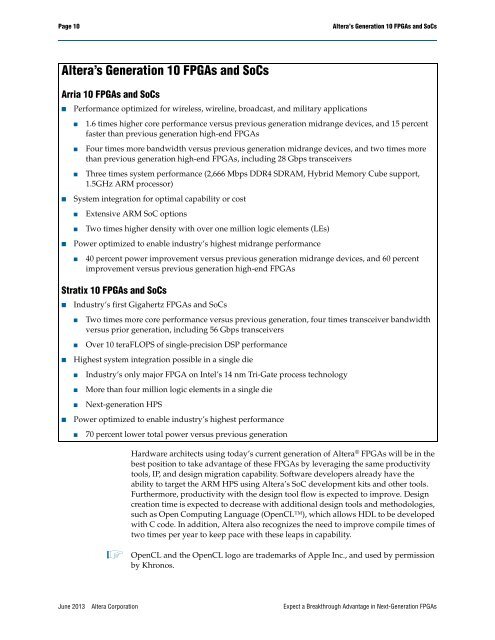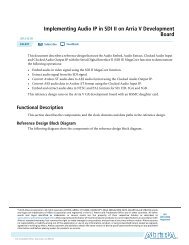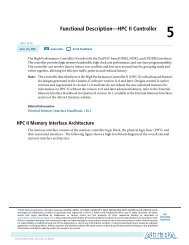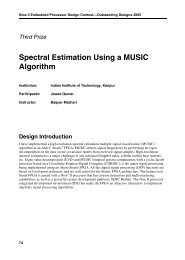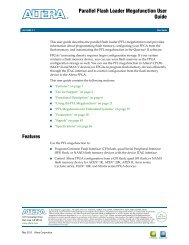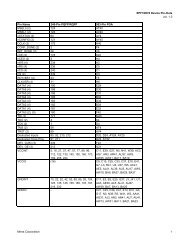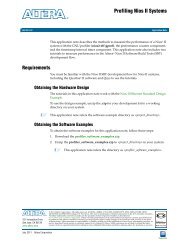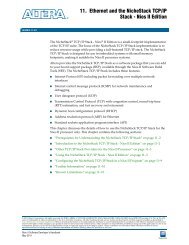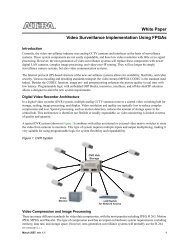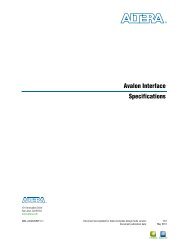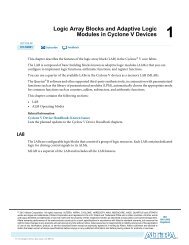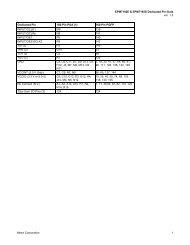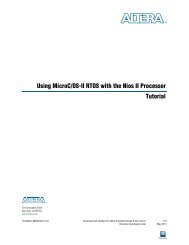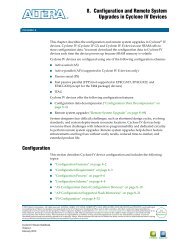Expect a Breakthrough Advantage in Next-Generation FPGAs - Altera
Expect a Breakthrough Advantage in Next-Generation FPGAs - Altera
Expect a Breakthrough Advantage in Next-Generation FPGAs - Altera
Create successful ePaper yourself
Turn your PDF publications into a flip-book with our unique Google optimized e-Paper software.
Page 10<br />
<strong>Altera</strong>’s <strong>Generation</strong> 10 <strong>FPGAs</strong> and SoCs<br />
<strong>Altera</strong>’s <strong>Generation</strong> 10 <strong>FPGAs</strong> and SoCs<br />
Arria 10 <strong>FPGAs</strong> and SoCs<br />
■<br />
■<br />
■<br />
Performance optimized for wireless, wirel<strong>in</strong>e, broadcast, and military applications<br />
■<br />
■<br />
■<br />
1.6 times higher core performance versus previous generation midrange devices, and 15 percent<br />
faster than previous generation high-end <strong>FPGAs</strong><br />
Four times more bandwidth versus previous generation midrange devices, and two times more<br />
than previous generation high-end <strong>FPGAs</strong>, <strong>in</strong>clud<strong>in</strong>g 28 Gbps transceivers<br />
Three times system performance (2,666 Mbps DDR4 SDRAM, Hybrid Memory Cube support,<br />
1.5GHz ARM processor)<br />
System <strong>in</strong>tegration for optimal capability or cost<br />
■<br />
■<br />
Extensive ARM SoC options<br />
Two times higher density with over one million logic elements (LEs)<br />
Power optimized to enable <strong>in</strong>dustry’s highest midrange performance<br />
■<br />
40 percent power improvement versus previous generation midrange devices, and 60 percent<br />
improvement versus previous generation high-end <strong>FPGAs</strong><br />
Stratix 10 <strong>FPGAs</strong> and SoCs<br />
■<br />
■<br />
■<br />
Industry’s first Gigahertz <strong>FPGAs</strong> and SoCs<br />
■<br />
■<br />
Two times more core performance versus previous generation, four times transceiver bandwidth<br />
versus prior generation, <strong>in</strong>clud<strong>in</strong>g 56 Gbps transceivers<br />
Over 10 teraFLOPS of s<strong>in</strong>gle-precision DSP performance<br />
Highest system <strong>in</strong>tegration possible <strong>in</strong> a s<strong>in</strong>gle die<br />
■<br />
■<br />
■<br />
Industry’s only major FPGA on Intel’s 14 nm Tri-Gate process technology<br />
More than four million logic elements <strong>in</strong> a s<strong>in</strong>gle die<br />
<strong>Next</strong>-generation HPS<br />
Power optimized to enable <strong>in</strong>dustry’s highest performance<br />
■<br />
70 percent lower total power versus previous generation<br />
Hardware architects us<strong>in</strong>g today’s current generation of <strong>Altera</strong> ® <strong>FPGAs</strong> will be <strong>in</strong> the<br />
best position to take advantage of these <strong>FPGAs</strong> by leverag<strong>in</strong>g the same productivity<br />
tools, IP, and design migration capability. Software developers already have the<br />
ability to target the ARM HPS us<strong>in</strong>g <strong>Altera</strong>’s SoC development kits and other tools.<br />
Furthermore, productivity with the design tool flow is expected to improve. Design<br />
creation time is expected to decrease with additional design tools and methodologies,<br />
such as Open Comput<strong>in</strong>g Language (OpenCL), which allows HDL to be developed<br />
with C code. In addition, <strong>Altera</strong> also recognizes the need to improve compile times of<br />
two times per year to keep pace with these leaps <strong>in</strong> capability.<br />
1 OpenCL and the OpenCL logo are trademarks of Apple Inc., and used by permission<br />
by Khronos.<br />
June 2013 <strong>Altera</strong> Corporation <strong>Expect</strong> a <strong>Breakthrough</strong> <strong>Advantage</strong> <strong>in</strong> <strong>Next</strong>-<strong>Generation</strong> <strong>FPGAs</strong>


